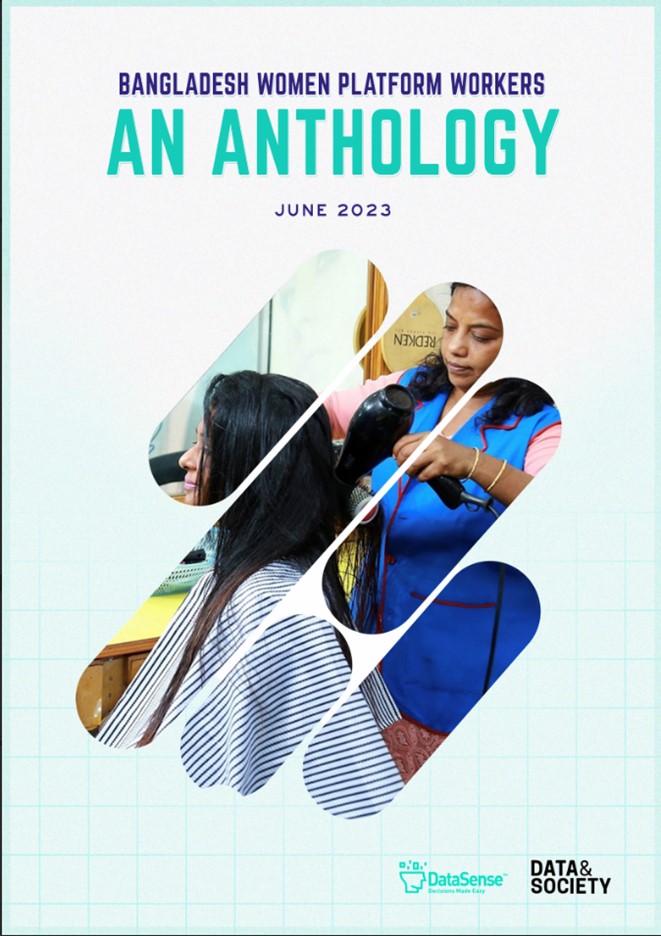Understand the evolving nature of work and the precarities faced by platform-based gig workers in Bangladesh, with a particular focus on women platform workers. This involved investigating how the “platformisation” of traditional informal work impacts their contractual terms, working conditions, and access to protection and welfare, and to assess whether it leads to genuine formalization or merely a “formalization of precarities.” The project also aimed to highlight the unique challenges and vulnerabilities faced by women in this sector due to gendered social norms and limited job opportunities.
Project timeline: Dec 2022 – July 2023
Partners:
Data & Society Research Institute
Project objective:
Critically examine the rapidly evolving platform economy in Bangladesh and its profound impact on workers, particularly women. It aimed to uncover how the digitalization of traditionally informal work influences employment relationships, working conditions, and access to fundamental labor protections. Specifically, the project sought to understand whether this “platformization” genuinely leads to the formalization of informal work or, instead, to a “formalization of precarities,” essentially embedding existing vulnerabilities within a digital framework. Through in-depth qualitative research, the project aimed to highlight the unique gendered challenges and systemic issues faced by women in this sector, advocating for more equitable and secure work environments.
Project outcome:
In-depth Understanding of Platform Precarities: The project provides a nuanced understanding of the instabilities, uncertainties, and insecurities inherent in platform-based gig work, particularly for women, by analyzing how traditional informal work precarities are transferred or exacerbated by digitalization.
Insights into Women’s Gendered Experiences: It sheds light on the specific challenges faced by women platform workers, who are predominantly in domestic and caregiving roles, and how sociocultural norms often lead to exploitative conditions, lack of contracts, and absence of social protections.
Evidence of Misclassification: The research provides examples and arguments for the misclassification of platform workers as “self-employed” or “independent contractors,” detailing how this strips them of basic labor rights and protection.
Recommendations for Regulatory Framework: The project advocates for a robust regulatory framework that reclassifies platform workers as employees, ensuring fair wages, decent working conditions, and social protection.
Highlighting the Need for Diversified Opportunities: It identifies the importance of expanding job opportunities for women beyond traditional domestic services through partnerships between platforms, government, and skill development institutions.
Emphasis on Stakeholder Responsibility: The report underscores the critical roles of platforms, customers, and civil society in advocating for and ensuring fairer treatment and improved conditions for platform workers.
Compilation of Worker Stories: Through an ethnographic approach, the project captured and presented the real-life experiences and stories of women gig workers, providing a humanistic perspective on their daily challenges and the impact of platformization on their lives.
Locations the project served: Nationwide – covering ten universities initially under UIHP.
Impact:
Informed Policy Debate: The anthology is expected to trigger debate among researchers, activists, and policymakers on shaping platform-based gig work to be more humane and equitable.
Increased Awareness of Worker Rights: By highlighting the misclassification and lack of labor rights, the report aims to raise public awareness about the shortcomings of the current platform system.
Potential for Regulatory Change: The detailed recommendations for reclassification and regulatory frameworks could facilitate the formalization of platform work and ensure platforms are responsible for providing fair wages, decent working conditions, and social protection.
Empowerment of Women Platform Workers: By advocating for formalization and the ability to form unions, the project seeks to empower women platform workers to collectively advocate for their rights and improve their upward mobility.
Promotion of Gender-Equitable Practices: The findings aim to encourage platforms to expand diverse job opportunities for women and to ensure fair treatment that challenges traditional gendered divisions of labor.
Three-country anthrology link: https://datasociety.net/library/the-formalization-of-social-precarities/

